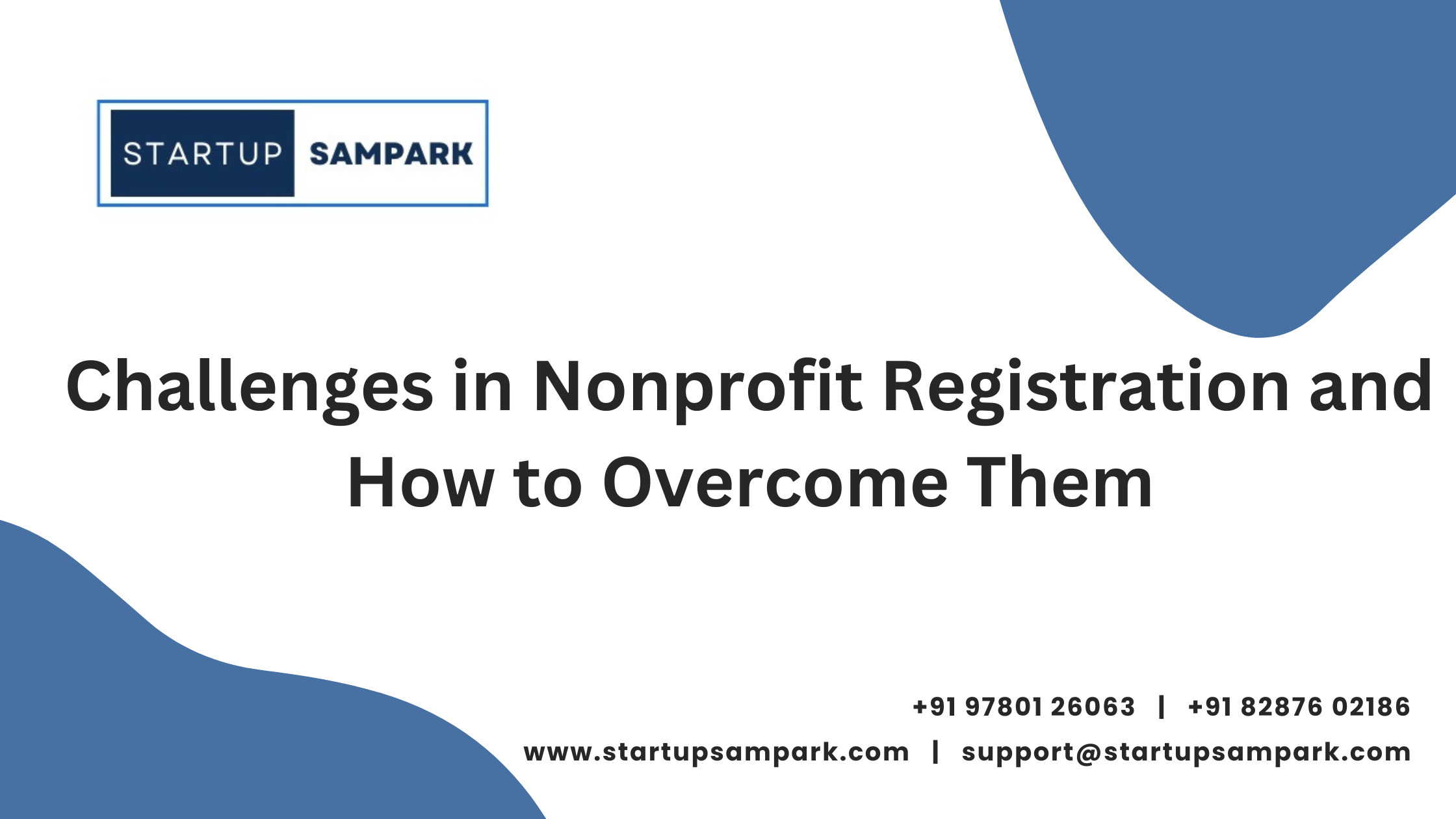Challenges in Nonprofit Registration and How to Overcome Them
The Complex Legal Framework
One of the primary challenges in nonprofit registration in India is navigating the complex legal framework. Nonprofits in India can be registered under various structures, such as Trusts, Societies, and Section 8 Companies, each with different legal requirements. For instance, registering a trust requires compliance with the Indian Trusts Act, 1882, while a society must comply with the Societies Registration Act, 1860, and a Section 8 company must adhere to the Companies Act, 2013. Each of these structures has its own set of rules for registration, governance, and compliance, making it difficult for new social entrepreneurs to decide the most suitable framework for their activities.
To overcome this challenge, entrepreneurs should seek legal or professional guidance before choosing the registration structure. Consulting with a lawyer or a company secretary who specializes in nonprofit registration can help streamline the process and ensure that all legal obligations are met. Understanding the pros and cons of each structure, as well as how they align with the nonprofit’s goals and operational requirements, can prevent costly mistakes.
Complicated Paperwork and Documentation
Another significant challenge in the nonprofit registration process is dealing with the extensive paperwork and documentation. Applicants need to submit detailed forms and supporting documents such as the Memorandum of Association (MOA), Trust Deed, objectives of the nonprofit, personal details of trustees or directors, and financial projections, among others. Any missing or incorrect documents can delay the registration process or even lead to rejection.
To overcome this hurdle, it is important for founders to thoroughly research the documentation requirements of their chosen registration structure. Seeking professional assistance in preparing and reviewing the documents ensures that all necessary paperwork is completed accurately and in compliance with legal standards. This approach can significantly reduce the time and effort involved in the registration process and ensure smoother approvals.
-
 Startup Registration (DPIIT Recognition)₹8,850.00
Startup Registration (DPIIT Recognition)₹8,850.00
Compliance with Tax and Regulatory Laws
One of the most significant obstacles faced by nonprofits during registration is ensuring compliance with India’s tax laws. Many nonprofits seek tax exemptions under Section 12A and Section 80G of the Income Tax Act, 1961, which requires submitting additional documentation and complying with ongoing regulatory reporting. Nonprofits also need to ensure compliance with Goods and Services Tax (GST) regulations if their turnover exceeds the threshold. Failure to comply with tax laws can lead to the revocation of tax exemptions, penalties, and even disqualification from receiving donations or grants.
Nonprofits can overcome this challenge by applying for tax exemptions as soon as they are eligible, ensuring they meet all necessary filing and reporting deadlines. It is crucial to maintain detailed records of all transactions, including donations and expenses, and seek advice from a tax professional or a chartered accountant. Regular audits and transparency in financial reporting help prevent legal issues related to tax compliance and ensure continued eligibility for exemptions.
Dealing with Government Approvals and Delays
Another common challenge faced during nonprofit registration is the delay in obtaining necessary government approvals. Due to the involvement of multiple government departments, such as the Registrar of Societies, Charity Commissioner, or the Registrar of Companies, processing times can vary significantly. Additionally, government officials may request additional information or clarification, further delaying the registration process. These delays can be frustrating for entrepreneurs eager to start their nonprofit activities.
To minimize delays, it is important to stay in constant communication with the relevant authorities and submit all required documentation in a timely manner. Being proactive in addressing any concerns or requests from government officials can help expedite the process. Alternatively, seeking assistance from consultants who are familiar with government procedures can help ensure the registration process is handled efficiently and with minimal delays.
Understanding Fundraising and Foreign Contribution Regulations
For many nonprofits, securing funding is a key step in launching and sustaining their operations. However, understanding and complying with fundraising laws, including the Foreign Contribution (Regulation) Act (FCRA), 2010, can be a major hurdle. FCRA regulates the receipt and use of foreign donations, and only those nonprofits that are registered under the FCRA can accept such funds. The registration process for FCRA is stringent, and nonprofits must demonstrate transparency and accountability in how foreign funds are utilized.
To overcome this challenge, nonprofits should ensure they comply with all requirements for FCRA registration before accepting any foreign contributions. This includes maintaining separate bank accounts for foreign funds, adhering to reporting and audit requirements, and ensuring that foreign donations are used only for approved purposes. It is advisable for nonprofits to consult with experts in FCRA regulations to navigate this process successfully.
Capacity to Meet Ongoing Compliance Requirements
Once a nonprofit is registered, it must adhere to various ongoing compliance requirements, such as annual reports, financial statements, audits, and submission of returns to the relevant authorities. Many nonprofits struggle to maintain the necessary capacity to fulfill these obligations due to limited resources or a lack of understanding of the legal requirements. Failing to comply with these ongoing requirements can lead to penalties, loss of nonprofit status, or revocation of tax exemptions.
To address this challenge, nonprofit organizations should develop a strong internal compliance framework from the outset. This can include setting up proper accounting systems, hiring or outsourcing the necessary legal, accounting, and audit functions, and establishing a dedicated team to manage compliance activities. By prioritizing compliance and maintaining a structured approach, nonprofits can avoid legal complications and focus on their mission and goals.
Startup, India
-
 Startup Registration (DPIIT Recognition)₹8,850.00
Startup Registration (DPIIT Recognition)₹8,850.00















Post Comment